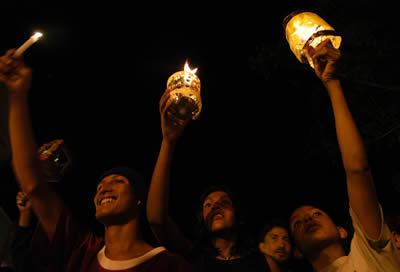Human Rights Day
This year's observance marks 20 years since the adoption by the World Conference on Human Rights of the Vienna Declaration and Programme of Action, remembers in his message the UN Secretary-General Ban Ki-moon.

Human Rights Day marks the anniversary of the adoption by the General Assembly of the landmark Universal Declaration of Human Rights. This year's observance also marks 20 years since a bold step forward in the struggle to make rights a reality for all: the adoption by the World Conference on Human Rights of the Vienna Declaration and Programme of Action. Drawing on the participation of more than 800 non-governmental organizations, national institutions, treaty bodies and academics, Member States adopted a far-reaching vision and created the Office of the High Commissioner for Human Rights (OHCHR) - thereby realizing one of the international community's long-held dreams.
In OHCHR's two decades of existence, five dedicated High Commissioners have spearheaded the work of the United Nations to further human rights globally. Through a wide range of norms and mechanisms, OHCHR advocates for victims, presses States to live up to their obligations, supports human rights experts and bodies, and -- through presences in 61 countries -- helps States to develop their human rights capacity.
Promoting human rights is one of the core purposes of the United Nations, and the Organization has pursued this mission since its founding. Then, as now, the key to success is the political will of Member States. It is States, in the first instance, that are obliged to protect human rights and prevent violations at a national level, and to stand up when other States fail to live up to their commitments. This is not always easy, and over the past 20 years we have seen genocide and many other appalling and large-scale violations of international human rights and humanitarian law.
Improving how the UN system prevents and reacts to impending catastrophes is at the heart of a new initiative, the Rights Up Front Action Plan. The Plan aims to ensure the UN system and all staff recognize the central place of human rights in the Organization's collective responsibilities. Above all, it seeks to strengthen our responses to widespread abuses and prevent such situations from arising in the first place through an emphasis on rights-based early warning and action.
On Human Rights Day, I call on States to fulfil the promises they made at the Vienna Conference. I reiterate the commitment of the UN Secretariat, funds and programmes to vigilance and courage in the face of human rights violations. Finally, I pay tribute to one of the great symbols of human rights of our time: Nelson Mandela, whose passing has plunged the world into sorrow but whose lifelong commitment to human dignity, equality, justice and compassion will forever remain an inspiration as we continue to build a world of all human rights for all.
Ban Ki-moon
Secretary-General
United Nations